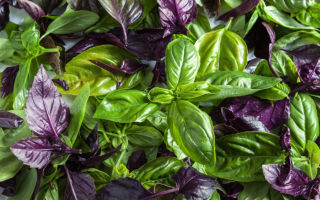Content
- 1 What does basil look like?
- 2 The chemical composition and calorie content of basil
- 3 Why basil is useful for the body
- 4 Can basil be pregnant and lactating
- 5 Can basil be given to a child
- 6 Benefits of Basil Seeds, Flowers and Root
- 7 Traditional medicine recipes with basil
- 8 The use of basil in cosmetology
- 9 Benefits and uses of basil essential oil
- 10 The use of basil in cooking
- 11 How to store basil
- 12 Potential harm to basil and contraindications
- 13 Conclusion
A herb called basil, ubiquitous throughout Eurasia, is one of the most popular culinary spices. But the benefits and harms of basil are much broader. Therefore, it is interesting to consider all its unique properties.
What does basil look like?
Around the world, the plant has dozens of different species and varieties. But ordinary fragrant basil is a long, up to 70 cm high herb with a straight stem, covered with small leaves. Basil blooms with white or pale pink flowers from early to late summer. The seeds ripen from August to September.
Basil is classified according to many criteria, but one of the main ones is the color of the leaves. In Europe, the green variety has become widespread, and in Asia you can often find a purple plant. Among themselves, they differ primarily in the saturation of smell and taste - lilac varieties are sharper and more spicy.
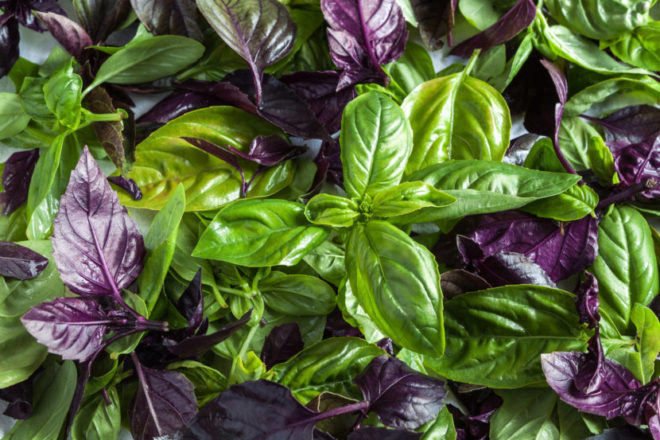
The chemical composition and calorie content of basil
Any plant species contains the richest complex of vitamins and chemicals valuable for the body. The composition includes:
- essential oils that give the plant a unique aroma;
- carotene;
- rutin;
- sugars and tannins;
- vitamins C and B2, as well as PP and K;
- potassium and copper;
- magnesium and manganese;
- cellulose;
- flavonoids.
Basil is quite nutritious - 100 g of the herb can contain up to 230 calories. And the largest share in its composition is occupied by proteins - 49%, followed by carbohydrates - 41% and fats - about 10%.
Why basil is useful for the body
Basil vitamins determine its benefits for almost all systems of the human body. In particular, this plant in various forms is capable of:
- relieve inflammation and soothe pain;
- fight infections of any origin;
- strengthen immunity and serve as the prevention of cancer;
- promote the healing of wounds, surgical sutures and ulcers;
- calm the nervous system;
- improve appetite;
- normalize bowel function, eliminate flatulence and spasms.

Benefits of basil for men
Basil herb is an excellent remedy for increasing potency. Natural acids contained in the plant improve blood circulation - this has a positive effect on the male reproductive system.
Benefits of basil for women
The plant is indispensable for painful menstruation, as it has a mild analgesic effect. In addition, basil has a tonic effect and can be a remedy for mood swings during PMS.
Basil for weight loss
The plant is rich in fiber and natural fatty acids - it is very beneficial to use it in limited quantities during the diet. The purple varieties of the plant give a particularly strong fat burning effect. And the seeds, brewed in boiling water, help cleanse the body of toxins, which speeds up the process of losing weight.
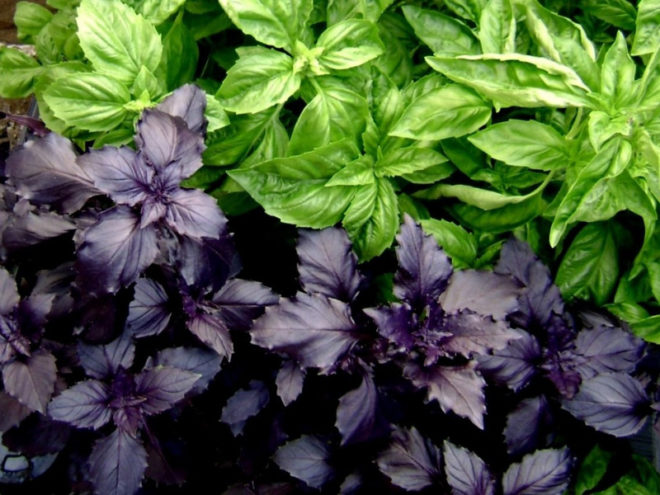
Can basil be pregnant and lactating
The benefit of the plant is that it contains a lot of valuable substances and vitamins. However, when carrying a child, it must be used with caution. The fact is that the spice can cause increased contractions of the uterus - and, accordingly, provoke premature birth or miscarriage.
Breastfeeding moms should also be careful with the seasoning. Breastfeeding basil can cause a woman to lose milk.
Can basil be given to a child
How old is basil for children? It is not recommended to give it to babies under 7 years old. Later, it is allowed to introduce the spice into the diet - basil in small quantities will strengthen the child's immunity and his nervous system.
Benefits of Basil Seeds, Flowers and Root
The benefits lie not only in the leaves of the plant. The seeds, flowers and root of the herb are also highly valued in medicine and cooking - they have different concentrations of nutrients.
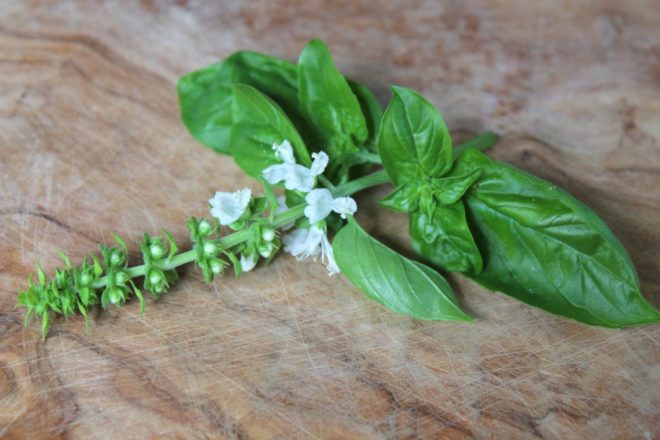
- For example, plant seeds are especially good for weight loss and for lowering bad cholesterol.
- The maximum benefit of the plant root is when it is used against intestinal infections and stomach upsets.
- Flowers and decoctions based on them are a wonderful sedative to help cope with stress.
Traditional medicine recipes with basil
Thanks to the benefits of the plant, it is actively used in home medicine. For a number of diseases, basil in all forms can have a powerful healing effect. For example, a spice is used:
- with cataracts, glaucoma and other eye diseases;
- with bleeding gums, gingivitis, stomatitis, caries;
- with skin ailments - eczema, acne and acne;
- with sexually transmitted diseases - gonorrhea and chlamydia;
- with joint ailments and physical injuries - dislocations, bruises, edema;
- with heart ailments;
- with hypertension and atherosclerosis;
- with diseases of the kidneys, stomach and respiratory organs.
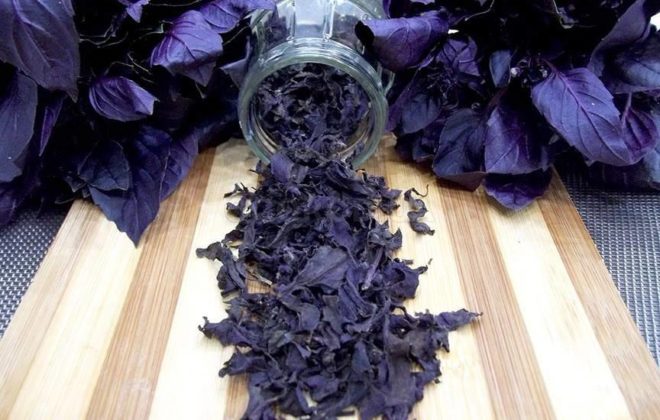
The anti-stress effect of the spicy herb is also highly valued - it is recommended for use in case of hysterical conditions and neuroses.
There are several basic plant-based recipes used in folk medicine.
Basil infusion
The benefits for hypertension will be from an easy-to-prepare infusion based on the flowers and leaves of the plant. They do it like this:
- dry basil is poured into a thermos and poured with boiling water;
- the drink is infused for 4 hours;
- after that it is cooled to room temperature.
You can use the product in half a glass no more than three times a day.
Basil decoction
The best cold remedy is a decoction of dried green or purple basil leaves.
- A handful of dry leaves are poured with boiling water.
- After boiling, the drink is boiled for another 15 minutes.
- The cooled broth is drunk in a glass three times a day, shortly before eating.
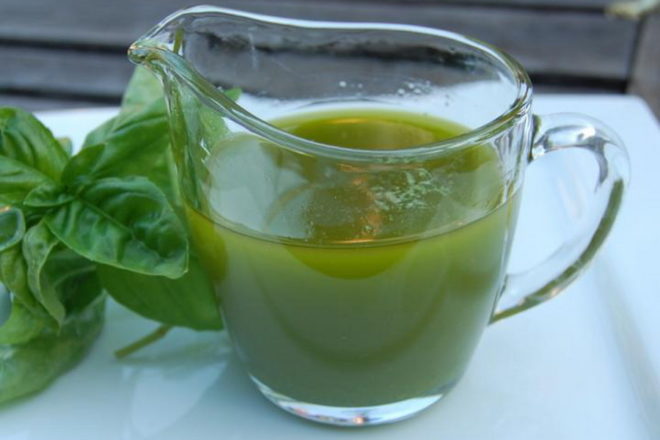
Basil tea
Another anti-cold and sedative agent is tea based on the leaves of the plant. For its preparation, you can take both dry and fresh leaves. A small handful of leaves are poured with boiling water, like a regular tea leaves, and infused for several minutes. To taste, you can add sugar or honey, lemon to such tea - and drink a fragrant drink to improve your well-being and mood.
Basil juice
From sore throat, inflammation in the throat and in the mouth, the juice of fresh basil leaves will help. The squeezed juice must be mixed with two large tablespoons of honey, brought to a homogeneous state and take this remedy 1 teaspoon three times a day.
Joint Treatment Ointment
Basically, the plant is used in folk medicine in the form of infusions and decoctions. However, it will also be beneficial for external use - for example, in the form of an ointment for joints. Fresh leaves of spicy herbs must be crushed and grinded to a state of gruel, mixed with fat cream, and then apply the mixture to sore spots. This ointment will have an analgesic effect and relieve inflammation.
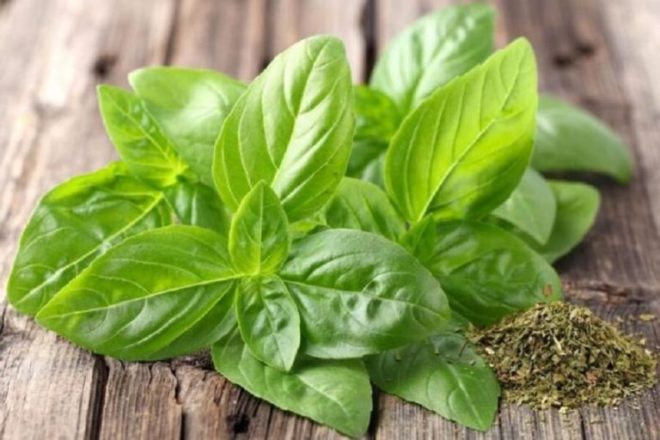
Other healthy recipes
There are dozens of recipes based on the root, leaf, or seed of the spice.
- For example, pounded fresh leaves of a plant are good for headaches if you apply them to the temples and the back of the head.
- Basil is an effective remedy for nasal congestion. The essential oils in its composition, when inhaling the scent of a fresh plant, quickly return freedom of breath.
- Dried leaves, brewed in a proportion of 40 g per 2 liters of water, can be added to the bath - this will not only give the water a pleasant aroma, but also help relieve inflammation and pain in rheumatism.
The use of basil in cosmetology
The health benefits of basil are also expressed in the fact that it improves the appearance. Spicy herb is actively used in home cosmetics - for a facelift to remove fine wrinkles and cleanse the skin.
The plant also benefits hair. Basil strengthens the roots, eliminates excessive fragility.
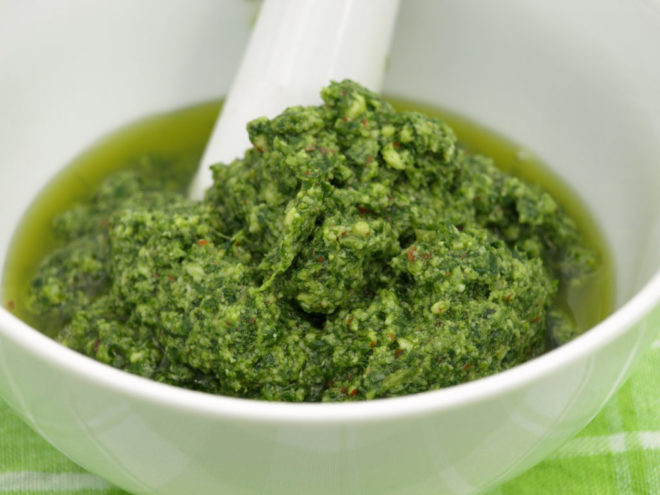
Face masks
To soften the skin of the face and remove inflammation, you can make the following mask:
- a handful of finely chopped basil leaves pour a glass of boiling water;
- wait 15 minutes for the product to infuse;
- wipe your face with the resulting lotion.
For the best effect, it is recommended to wash with basil infusion every 2 days.
Fresh leaves of a spicy plant will effectively help from blackheads. They need to be moistened with warm water and firmly applied to problem areas of the face for 5-7 minutes, then removed and washed with cool water. Applying a cleansing mask a couple of times a week will cleanse your pores.
Hair masks
For dry and very brittle hair, the following mask will be useful:
- essential basil oil (5 drops) is mixed with mustard powder (50 g) and white henna (50 g);
- egg yolk is added to the ingredients;
- all components are thoroughly mixed and applied to the hair, evenly distributing along the length.
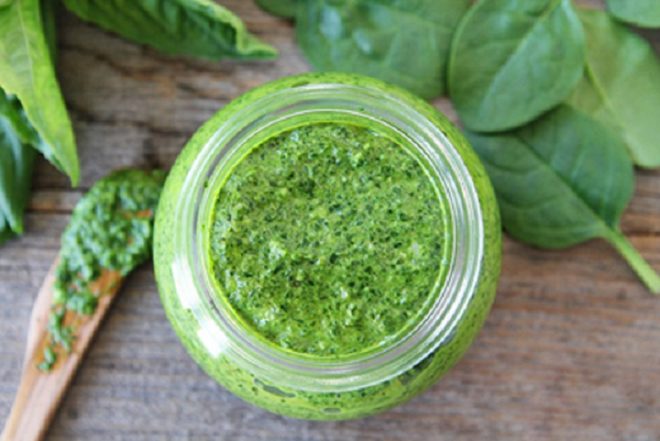
The mask is kept for about 20 minutes and washed off with warm water. It is recommended to repeat the procedure three times a week.
If your hair is oily, another mask will be helpful:
- fresh chopped basil leaves are mixed with olive oil (1 cup) and rosemary and geranium essential oils (2 drops each);
- basil oil is added to the composition (5 drops);
- the mask is thoroughly mixed and applied to the hair closer to the roots.
It is necessary to keep the mixture until rinsing for at least 40 minutes, wrapping the hair with a film and a towel. It is recommended to repeat every other day.
Benefits and uses of basil essential oil
One of the best-known herbal products is essential basil oil. Its benefit lies in the fact that the oil has a powerful sedative effect, relieves migraines, and helps to cope with nausea. Most often, for medicinal purposes, it is simply applied to whiskey to inhale the healing aroma.
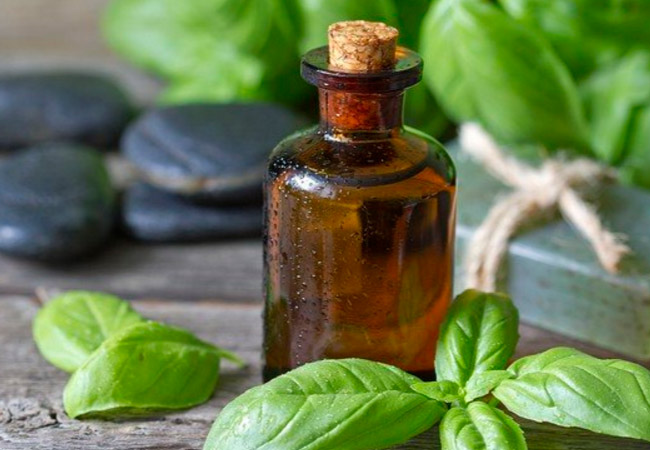
Oil is often used in cooking - it is mainly flavored with salads, and then the remedy serves as a good prevention of stomach disorders. In cosmetology, basil oil is added to masks, creams, shampoos and rinses, and toothpastes.
The use of basil in cooking
Basil is one of the traditional spices in many national cuisines. It is added to food in fresh and dried form, as well as in the form of oil. The plant is found:
- in soups, appetizers and pates;
- in hot sauces;
- among pizza ingredients;
- in sandwich oils and cheeses, in sausages.
Sometimes you can even see it in desserts, albeit in very small quantities.
How to store basil
Fresh basil is very healthy - but it doesn't last long. It is customary to dry the plant - its aroma only becomes stronger from this, and the beneficial properties of dried basil are fully preserved throughout the whole year.
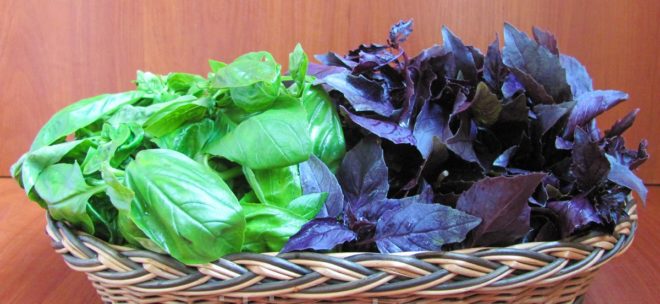
The collection of fresh leaves is usually carried out at the very beginning of summer, while the plant has not yet bloomed. Young leaves are laid out in a warm, dry place in the shade or placed in an oven heated to only 40 degrees. After the leaves are completely dry, they are crushed and put into a paper or linen bag.
The flowers of the plant collected in the middle of summer are dried in the same way. The seeds are harvested after the plant has faded. By the way, it is not necessary to dry the seeds - if you just keep them away from bright light at room temperature, the benefits will last up to 5 years.
Potential harm to basil and contraindications
No matter how great the benefits of the plant, it has a number of contraindications. Leaves, seeds, flowers and roots cannot be used:
- with chronic low blood pressure;
- epileptics;
- with thrombophlebitis and varicose veins;
- those who suffer from severe nervous disorders.
Basil should be used with extreme caution during pregnancy.
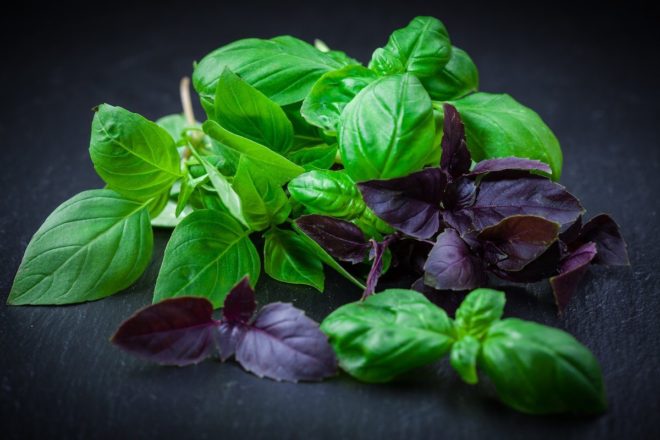
Conclusion
The benefits and harms of basil depend on how carefully and carefully you approach it. When used wisely, the herb will strengthen the body's strength and take care of beauty. But with some diseases and conditions, basil can be harmful.

